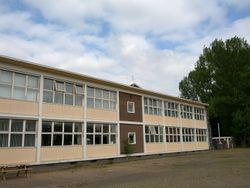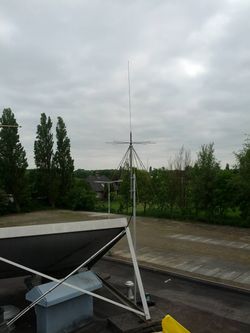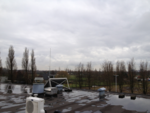RevRadio: Difference between revisions
No edit summary |
|||
| Line 3: | Line 3: | ||
|Status=In progress | |Status=In progress | ||
|Contact=User:Bertrik_Sikken | |Contact=User:Bertrik_Sikken | ||
|Contact=User:Maxell | |||
}} | }} | ||
| Line 70: | Line 71: | ||
* Teamviewer, ID: 675540724 | * Teamviewer, ID: 675540724 | ||
* VNC: geheim ;-) | * VNC: geheim ;-) | ||
=== Running projects === | |||
== AIS decoding == | |||
* COAA's shipplotter to APRS.fi | |||
* [http://aprs.fi/info/i/RevSpace Our APRS.fi page] | |||
* [http://aprs.fi/#!call=i%2FRevSpace&v=heard Heatmap of received ships] | |||
== TODO == | == TODO == | ||
Stuff we are still planning to do: | Stuff we are still planning to do: | ||
* wait for proper cables for the ham-it-up | * <strike>wait for proper cables for the ham-it-up</strike> | ||
* think about an antenna for HF | * think about an antenna for HF | ||
Revision as of 00:28, 29 September 2013
| Project RevRadio | |
|---|---|
| Status | In progress |
| Contact | User:Maxell |
| Last Update | 2013-09-29 |
Introduction

This project consists of several small sub-projects related to radio reception at RevSpace. Reception is based (so far) on DVB-T dongles using an RTL2832 chip to do SDR (software-defined-radio).
Hardware
HF (0 - 30 MHz)
To receive signals from the relatively low frequency "HF" band, we have a ham-it-up board. The ham-it-up converts signals from 0-30 MHz up to 125-155 MHz, this makes is possible to use an RTL2832-based dongle to receive them.
Things that can be received with this setup:
- morse and rtty beacons;
- amateur radio voice;
- amateur radio SSTV (slow-scan TV);
- number stations such as the buzzer;
- commercial AM broadcasts
- etc.
Stuff we should can implement
- Put it in a box!
- Experiment with different (home made) antennas such as the mini whip
- Hooking it up to our main SDR computer. Requires antenna on the roof
Generic VHF/UHF (24 - 1700 MHz)

For generic radio reception in the VHF/UHF bands, we have a setup consisting of a discone antenna (ICOM AH-7000) on the roof of RevSpace and an RTL2832 dongle (R820T tuner). A simple filter (1/4 wave open stub) has been built to suppress very strong pager signals.
Things that can be received with this setup:
- Citizens Band radio, 27 MHz
- 10 meter amateur band, 28-29.7 MHz
- 4 meter amateur band, 70-70.5 MHz
- broadcast FM stereo, 88-108 MHz;
- air traffic (voice);
- P2000 paging traffic at 169.650 MHz;
- weather images from the NOAA-15/18/19 weather satellites, at around 137 MHz;
- APRS traffic;
- weather info from weather balloons, at 400-410 MHz;
- ads-b/mode-s airplane transponders, at 1090 MHz
- etc.
Todo:
- Get rid of the massive broadcast FM band, it's worth the trade between doing FM DX and broadcast FM noise.
HAB tracker (434-435 MHz)

For tracking high-altitude balloons, we have a setup consisting of a Diamond X-50N antenna on the roof of RevSpace, a so-called hab-amp (bandpass filter for 430-440 MHz and low noise amplifier) and an RTL2832 dongle (FC0013 tuner). For more information, see the dedicated page at HAB_Tracker_Station
Things that can be received with this setup:
- The complete 70 cm amateur band, 430-440 MHz
- 70 cm ISM band, ~433 Mhz
- high-altitude balloons, see spacenear tracker
Software
Currently one PC is dedicated to radio reception, called "habtracker". To start the PC:
- Windows XP, hostname "habtracker", IP 10.42.44.94 (MAC 00:21:70:02:62:0f)
- Start the machine with a magic WoL packet: 'wakeonlan -i 10.42.255.255 00:21:70:02:62:0f; ping habtracker'
Remote control
The PC can be remotely controlled as follows:
- Teamviewer, ID: 675540724
- VNC: geheim ;-)
Running projects
AIS decoding
- COAA's shipplotter to APRS.fi
- Our APRS.fi page
- Heatmap of received ships
TODO
Stuff we are still planning to do:
wait for proper cables for the ham-it-up- think about an antenna for HF